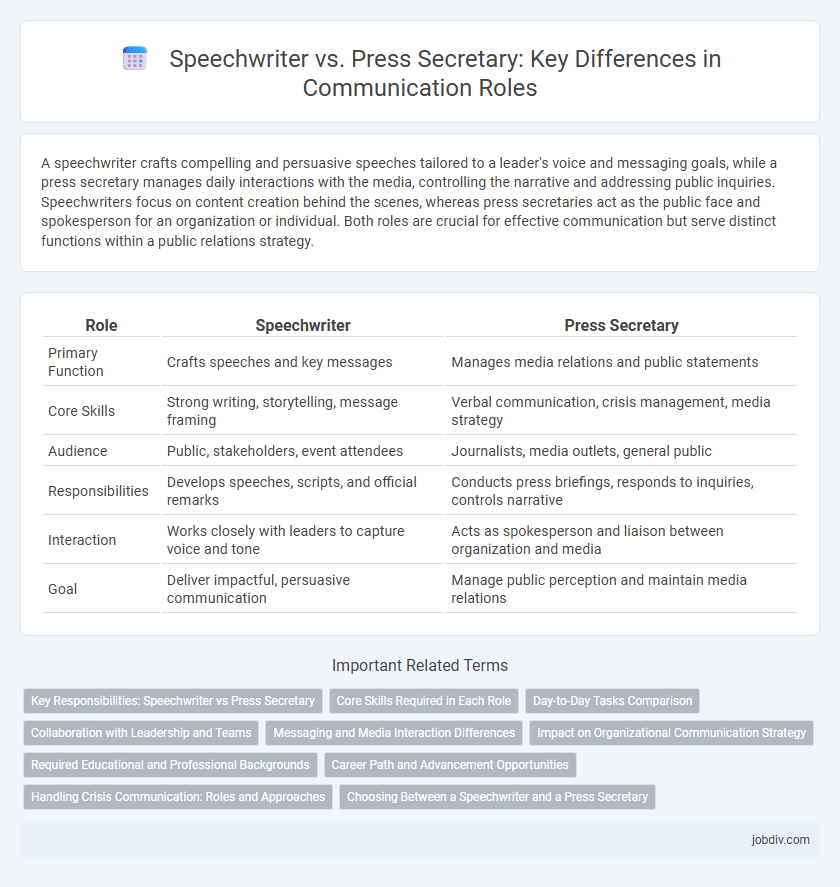A speechwriter crafts compelling and persuasive speeches tailored to a leader's voice and messaging goals, while a press secretary manages daily interactions with the media, controlling the narrative and addressing public inquiries. Speechwriters focus on content creation behind the scenes, whereas press secretaries act as the public face and spokesperson for an organization or individual. Both roles are crucial for effective communication but serve distinct functions within a public relations strategy.
Table of Comparison
| Role | Speechwriter | Press Secretary |
|---|---|---|
| Primary Function | Crafts speeches and key messages | Manages media relations and public statements |
| Core Skills | Strong writing, storytelling, message framing | Verbal communication, crisis management, media strategy |
| Audience | Public, stakeholders, event attendees | Journalists, media outlets, general public |
| Responsibilities | Develops speeches, scripts, and official remarks | Conducts press briefings, responds to inquiries, controls narrative |
| Interaction | Works closely with leaders to capture voice and tone | Acts as spokesperson and liaison between organization and media |
| Goal | Deliver impactful, persuasive communication | Manage public perception and maintain media relations |
Key Responsibilities: Speechwriter vs Press Secretary
Speechwriters craft tailored speeches that convey a leader's vision and key messages with clarity and impact, ensuring alignment with organizational goals and audience expectations. Press secretaries manage media relations, deliver official statements, and handle crisis communication to shape public perception and maintain consistent messaging. Both roles require strategic communication skills, but speechwriters focus on content creation while press secretaries emphasize media interaction and message dissemination.
Core Skills Required in Each Role
A speechwriter must excel in persuasive writing, storytelling, and deep understanding of policy to craft compelling narratives tailored to specific audiences. A press secretary requires outstanding verbal communication, media relations expertise, and crisis management skills to effectively represent and defend an organization's stance publicly. Both roles demand strategic thinking, but the speechwriter focuses on message development while the press secretary prioritizes message delivery.
Day-to-Day Tasks Comparison
Speechwriters primarily craft speeches, statements, and key messages tailored to a leader's voice, ensuring clarity and persuasion in public addresses. Press secretaries manage daily media relations, including responding to inquiries, preparing press releases, and organizing briefings to maintain consistent communication with the public and press. While speechwriters focus on content creation behind the scenes, press secretaries engage actively with journalists and oversee real-time messaging strategies.
Collaboration with Leadership and Teams
A speechwriter collaborates closely with leadership to craft clear, persuasive messages that align with organizational goals, ensuring the tone and content reflect the leader's voice and vision. Press secretaries coordinate communication strategies between leadership, media, and internal teams, managing the flow of information and addressing public inquiries to maintain a consistent narrative. Both roles require seamless teamwork with various departments to synchronize messaging and uphold the organization's public image.
Messaging and Media Interaction Differences
A speechwriter crafts tailored messages that articulate a leader's vision and policy with precision, focusing on the language and tone to engage various audiences effectively. A press secretary manages real-time media interaction, delivering consistent, concise responses and controlling the narrative during press briefings to shape public perception. While speechwriters emphasize strategic message development, press secretaries prioritize media relations and rapid communication management.
Impact on Organizational Communication Strategy
A speechwriter shapes the organization's messaging by crafting speeches that articulate core values and strategic goals, ensuring consistency and emotional resonance in public communications. In contrast, a press secretary manages real-time interactions with the media, controlling the narrative through timely responses and proactive media relations to maintain a positive public image. Both roles are integral to an organization's communication strategy, with speechwriters focusing on planned messaging and press secretaries on dynamic media engagement, collectively enhancing coherence and influence.
Required Educational and Professional Backgrounds
Speechwriters typically hold a degree in English, communications, journalism, or political science, combined with strong writing skills and experience in political or corporate communications. Press secretaries often have a background in public relations, journalism, or communications, with expertise in media relations, crisis management, and press briefing experience. Both roles benefit from internships or work in governmental or corporate communication environments to develop practical knowledge and professional networks.
Career Path and Advancement Opportunities
A speechwriter typically begins their career crafting speeches for politicians, executives, or public figures, often developing expertise in messaging, tone, and audience engagement, which can lead to senior communications roles or chief speechwriter positions. In contrast, a press secretary usually starts in entry-level media or public relations roles and progresses by managing press relations, crisis communication, and media strategy, with advancement opportunities including senior spokesperson roles, communications director, or political advisory positions. Both career paths offer growth into influential communication leadership, but a press secretary's trajectory tends to emphasize media interaction and public representation, while a speechwriter focuses on content creation and narrative shaping.
Handling Crisis Communication: Roles and Approaches
Speechwriters craft strategic messages that shape the narrative during crises, ensuring clarity and emotional resonance to influence public perception. Press secretaries serve as the direct communication link between the organization and media, managing real-time information flow, addressing inquiries, and maintaining transparency. Effective crisis communication relies on the collaboration between speechwriters' carefully prepared statements and press secretaries' agile response management.
Choosing Between a Speechwriter and a Press Secretary
Choosing between a speechwriter and a press secretary depends on the communication objectives and the nature of public engagement. A speechwriter crafts tailored, impactful messages for key speeches and presentations, enhancing persuasion and clarity. A press secretary manages media relations, controls information flow, and handles crisis communication to maintain the organization's public image.
Speechwriter vs Press Secretary Infographic

 jobdiv.com
jobdiv.com